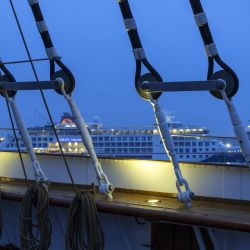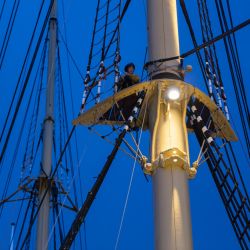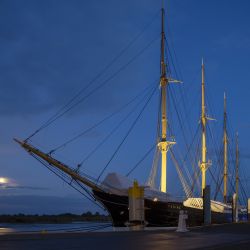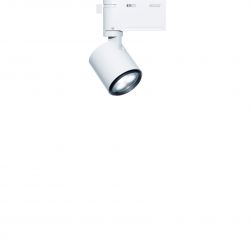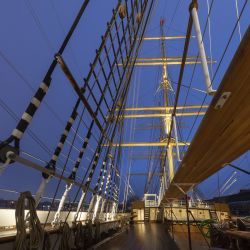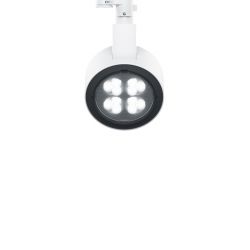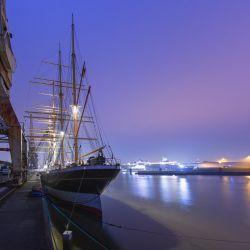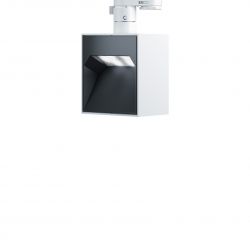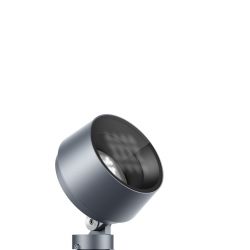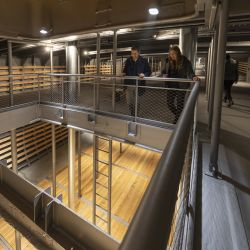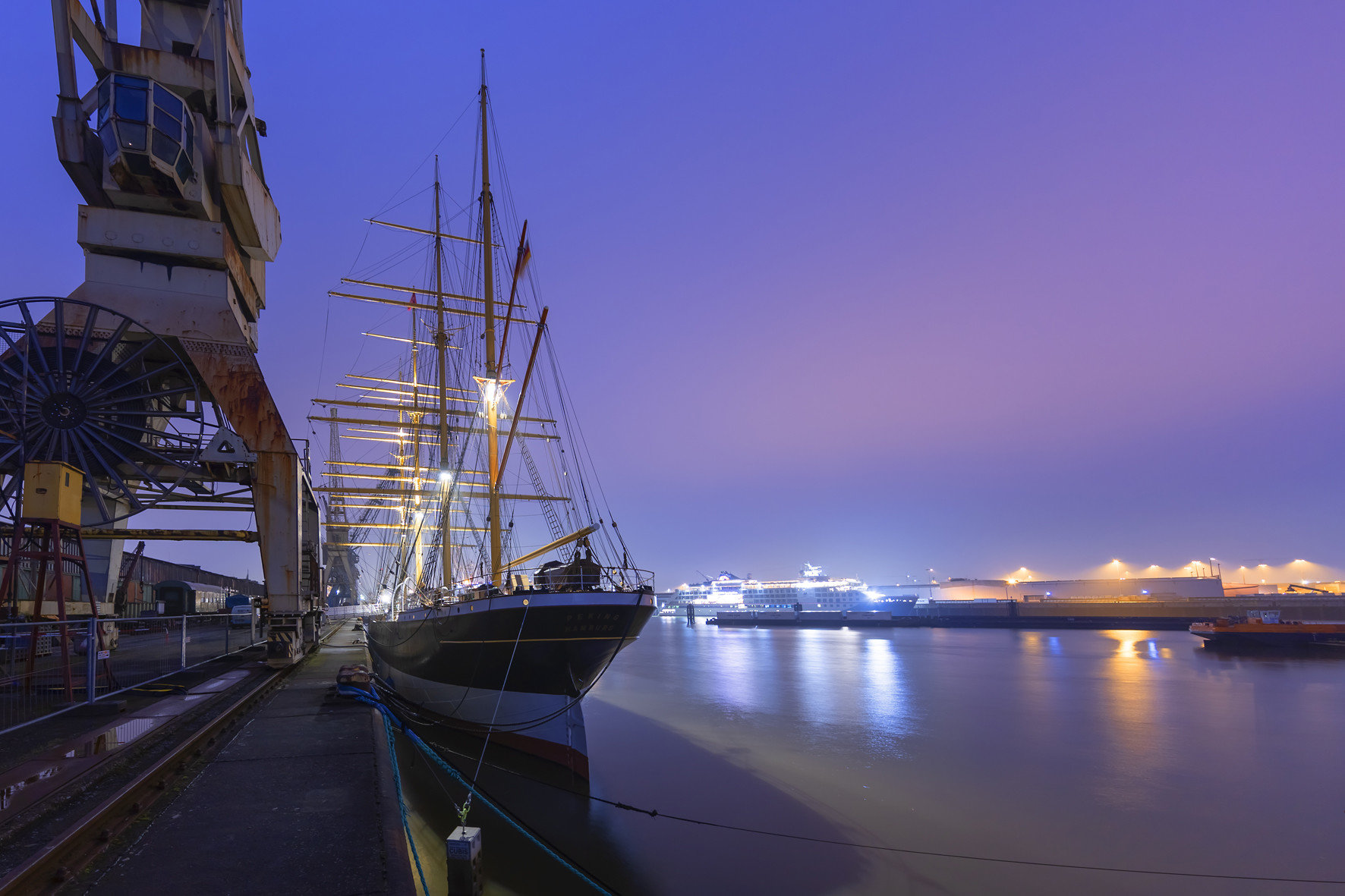
Download this article:
Built in 1911 by Blohm + Voss in Hamburg, the “Peking” navigated around Cape Horn a total of 34 times to bring saltpetre from Chile to Germany. Now the legendary “Flying P-Liner”, once one of the largest and fastest sailing cargo ships in the world, has been extensively restored. The Peking will soon be welcoming visitors to the new German Port Museum in Hamburg as a fully accessible attraction. Thanks to “ERCO individual” special solutions, which reflect the historical appearance of the ship in terms of colour, the imposing four-masted barque now radiates in new splendour.
The steel sailing cargo ships from the F. Laeisz shipping company, which at the beginning of the 20th century became known as the “Flying P-Liner”, were reliable and fast under full sail on the world's oceans. The “Peking” sailed from Hamburg across the Atlantic to bring saltpetre from Chile back to Germany for agriculture and the industrial sector. On these adventurous voyages, the four-masted barque sailed around Cape Horn a total of 34 times until 1932. She later served as a floating childrens home and naval trainingschool on the River Medway in Upnor, England. Since 1974 the ship was moored at the pier of the Southstreet Seaport Museum New York and was in very poor condition. The aim of the complex restoration, which took approximately three years and was carried out by the Hamburg Maritime Foundation, was to preserve the historic sailing vessel as a floating heritage. On its outside the “Peking” was to be restored to the state it had been in during its last saltpetre voyage - in order to be the flagship of the new German Port Museum in its original home of Hamburg.
Spectacularly displayed: the cavernous holds and breathtaking superstructures of the sailing ship
With its slender steel hull, only 14 metres wide but with a length of 
115 metres, the “Peking” was, in its time, considered to be a masterpiece of technology. It was able to ship loads of up to 5,000 tons. Future visitors to the port museum will be able to climb into the belly of the restored ship via two newly added staircases and a glass elevator. This is where visitors will be able to experience the impressive hold which extends over the inner floor and tween deck. Pollux LED spotlights with wide flood distribution (approx. 50°) illuminate the six metre-high interior floor structure with uniform lighting. They emphasise the hall-like impression with atmospheric light and create a pleasant experience for visitors to the museum ship. Pollux LED spotlights also uniformly illuminate the tween deck above the inner floor. All spotlights below deck are track-mounted, and can therefore be flexibly rearranged for future exhibition scenarios as well as used to accentuate individual exhibits with the use of interchangeable lenses.
The museum ship itself becomes an exhibit with ERCO light
The main colours of the “Peking” are black, white, yellow and brown. All the Kona outdoor projectors installed in the hull, bridge deck and rigging areas have been individually matched to this colour scheme. The luminaires, in various sizes, wattages and with various light distributions, are thus perfectly integrated into the design of the historic cargo ship but themselves remain as inconspicuous as possible. Kona luminaires in broom yellow were used throughout the rigging of the “Peking”, consisting of four masts and a total of 18 yardarms, which matched the yellow paint of the steel construction in this area. Each mast has four Kona spotlights (2x48W and 2x24W) shining downwards with flood distribution to illuminate the open areas on deck. Each mast also has platforms, the so-called spreaders. The three large masts each have two spreaders, the smallest has one spreader. Three Kona uplights with 24W and spot distribution are installed above each spreader for illuminating the verticals.
On the main and bridge decks of the “Peking”, Kona projectors 
(24W LED) with oval flood distribution (approx. 20° x 60°) are used in the area of the wooden pin rails. Integrated into the steel of the bulwark, they highlight the ropes and cordage of the rigging and as part of the “ERCO individual” service they were all matched to the colour of the pin rails. Extremely high lumen-output 72W LED Kona projectors in a special RAL 9010 housing colour (pure white) were installed along the white painted railing. With extra wide flood (80°) distribution they illuminate the entire rig including its horizontal components to a total height of around 50 metres. Illumination with warm white 3000K light allows the superstructures of the historical ship to radiate in front of the backdrop of a night sky in a golden-yellow tone as if illuminated from within.
The “Peking” will never again sail the world's oceans, but is destined to lie at anchor as the future German Port Museum's primary walk-in attraction. Nevertheless, the outdoor luminaires have to withstand harsh environmental conditions. ERCO's special coating process guarantees corrosion-protected surfaces that defy the weather. The projectors have an IP65 protection rating, which means they are dustproof and protected against jets of water from all directions. In addition, the longevity of the maintenance-free LEDs is particularly advantageous in difficult-to-access areas such as ship masts.
Project data
Client: Hamburg Maritime Foundation (SHM), Hamburg / Germany
Project management: Joachim Kaiser (SHM)
Owner since May 2020: Hamburg Historical Museums Foundation
Project Manager for the German Port Museum: Ursula Richenberger
Photography: Frieder Blickle, Hamburg / Germany
Products: Kona, Pantrac, Parscan, Pollux
Photo credits: © ERCO GmbH, www.erco.com, 
photography: Frieder Blickle
About ERCO
The ERCO Light Factory in Lüdenscheid is a leading international specialist in architectural lighting using LED technology. The family business, founded in 1934, now operates as a global player with over 60 subsidiaries, branches and agencies in over 40 countries worldwide. Since 2015 ERCO's portfolio has been 100% LED. Inspired by "light digital" as its leitmotif, ERCO in Lüdenscheid develops, designs and produces digital luminaires with focus on photometrics, electronics and design. Working closely with architects, lighting designers and engineers, ERCO develops lighting tools used primarily for applications in the following fields: Work, Shop, Culture, Community, Hospitality, Living, Public and Contemplation. ERCO understands digital light as the fourth dimension of architecture - providing highly precise and efficient lighting solutions to support creative designers in turning their visions into reality.
If you require any further information on ERCO or image material, please visit us at www.erco.com/presse. We can also provide you with material on projects worldwide for your media coverage.
Relevant image material
© ERCO GmbH, www.erco.com
© ERCO GmbH, www.erco.com
© ERCO GmbH, www.erco.com
© ERCO GmbH, www.erco.com
© ERCO GmbH, www.erco.com
© ERCO GmbH, www.erco.com
© ERCO GmbH, www.erco.com
© ERCO GmbH, www.erco.com
© ERCO GmbH, www.erco.com
© ERCO GmbH, www.erco.com
